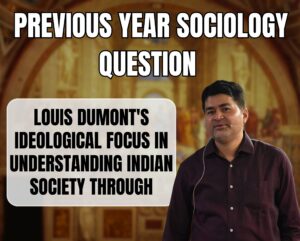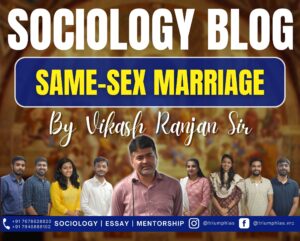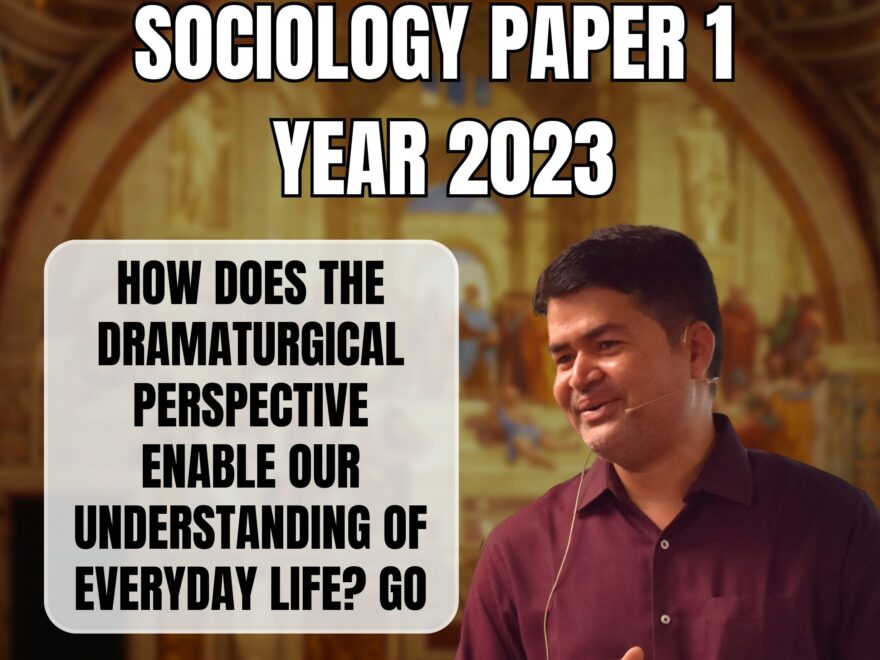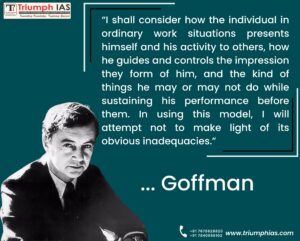How does the dramaturgical perspective enable our understanding of everyday life? Go
Section: A
Sociology Paper 2023 Analysis
(Relevant Paper 1: Unit-2 Sociology as Science; Major theoretical strands of research methodology)
Question: 1 (C) How does the dramaturgical perspective enable our understanding of everyday life? Go
(10 Marks)
| Introduction: Brief Idea About the Dramaturgical Perspective
Main Body: Significance of Dramaturgical Perspective in Understanding Daily Actions, Limitations of the Perspective Conclusion: Significance in Expanding the Scope of Sociology and Providing Unique Aspect of Social Reality |
Introduction:
- The dramaturgical perspective, often associated with sociologist Erving Goffman, introduces the concept of the “dramaturgical self” and the “front stage” and “backstage” aspects of everyday life. By viewing human interactions through the lens of a theatrical performance, it offers valuable insights into understanding daily actions. According to this perspective, individuals present themselves to others based on their cultural values, societal norms, and the expectations of their audience.
- They perform different roles in different situations, which are like different scenes in a play. In drama , the role of every individual is fixed and meaning are attached and individuals are not only aware about his/her role but also about others role too. According to Goffman society is a drama stage, where different individuals assign meaning to not only his or her role , but attaches meanings to others role also. Society becomes possible with meaningful role sets.
Main body:
Significance of dramaturgical perspective in shaping understanding of everyday life
- The dramaturgical perspective suggests that individuals adopt roles and person as similar to actors in a play. This concept helps us see how people manage their self-presentation in various social situations, often adjusting their behaviour and appearance to fit societal expectations.
- In keeping with the theatre metaphor, Goffman calls these public presentations front stage. The preparation for the role occurs. back stage, which is a more private component of the process. The back stage may include considering potential dialogue, personal appearance, and other areas contributing to the desired, dominant impression.
- For example an individual’s preparation for a job interview occurs backstage. During this phase, they meticulously choose their attire and rehearse responses to potential interview questions. The actual interview, characterized as the front stage, unfolds as a dynamic interaction between two individuals, where both participants engage in impression management through their actions and communication.
- Goffman’s perspective emphasizes that people engage in impression management, consciously or unconsciously. Impression management, or shaping the opinions or views of others, is the goal of these public representations of the self. Impression management is achieved when individuals consciously or unconsciously select the information presented in interactions with others.
- According to Goffman, interactions between two or more people will involve impression management, which is always based on attempts to persuade others to accept a particular definition of the social situation. They strategically craft their behaviour to create desired impressions, such as professionalism at work or friendliness in social gatherings. This helps us recognize the per formative nature of daily life.
- For example social interactions can be used to create the impression of rebellion also against these expectations. In these cases, individuals may adopt a commonly understood set of symbols or behavior to represent their revolt against societal norms. Such scenarios are also examples of impression management.
- In daily interactions, individuals take on specific roles and follow socially scripted behaviours. These roles and scripts guide our actions and interactions, making them predictable and understandable. This perspective helps us analyze how societal norms influence our behaviour. For example father saying that ”I have given my daughter permission“ to choose her career can be seen as assertion of role by father.
- The idea of an audience in the dramaturgical perspective highlights that our actions are often influenced by the perceived reactions and judgments of others. Understanding this aspect helps us grasp the significance of social validation and its impact on our choices.
- Goffman’s concept of “stigma” refers to characteristics or attributes that society deems undesirable. The dramaturgical perspective sheds light on how individuals with stigmatized identities or conditions navigate their daily lives by managing information and impressions.
- Recognizing that not all performances are smooth, the dramaturgical perspective helps us understand conflicts, awkward moments, and instances where individuals “break character.” These situations offer insights into social dynamics and the challenges of maintaining a consistent front-stage persona.
- The dramaturgical perspective provides insight into how surface appearances work and how they may deceive. We cast other people into roles as we walk down the street, and we recognize that many places comprise routine stages where we must act in certain ways, whether we feel like it or not. This understanding helps us navigate social interactions and the expectations placed upon us.
The dramaturgical approach, though insightful for understanding everyday life, has certain limitations:
- Descriptive, not Explanatory: Critics argue that it’s descriptive rather than explanatory, offering insights into how people manage impressions without delving into the underlying reasons for their behaviour.
- Not a Comprehensive Theory: This perspective falls short of providing a comprehensive theory that can offer all-encompassing explanations for human behavior or generate testable hypotheses.
- Invalid Inferences: Comparing offstage roles to theatrical roles can lead to invalid inferences, as individuals may present different facets of themselves in various contexts, but this doesn’t equate their offstage roles with those of stage actors.
- Limitations of the Metaphor: The metaphor itself imposes limitations, as theatrical performances are artificial, while real-life interactions are multifaceted and intricate. This metaphor may oversimplify the complexities of human behaviour and social interactions.
Conclusion:
Despite its limitations ,the core element of the dramaturgical approach is the creation of the self through social interactions. Whether it’s a face-to-face interaction or an online interaction, the dramaturgical approach is useful in understanding how individual identities are created and recreated in everyday life.
Related Blogs…
 |
 |

To master these intricacies and fare well in the Sociology Optional Syllabus, aspiring sociologists might benefit from guidance by the Best Sociology Optional Teacher and participation in the Best Sociology Optional Coaching. These avenues provide comprehensive assistance, ensuring a solid understanding of sociology’s diverse methodologies and techniques.
META TAGS:
Dramaturgical perspective, Erving Goffman, Everyday life, Impression management, Societal roles, Social validation, Stigmatized identities, Social interactions, Limitations, Human behavior, Front stage, Backstage
Why Vikash Ranjan’s Classes for Sociology?
Proper guidance and assistance are required to learn the skill of interlinking current happenings with the conventional topics. VIKASH RANJAN SIR at TRIUMPH IAS guides students according to the Recent Trends of UPSC, making him the Best Sociology Teacher for Sociology Optional UPSC.
At Triumph IAS, the Best Sociology Optional Coaching platform, we not only provide the best study material and applied classes for Sociology for IAS but also conduct regular assignments and class tests to assess candidates’ writing skills and understanding of the subject.
Choose The Best Sociology Optional Teacher for IAS Preparation?
At the beginning of the journey for Civil Services Examination preparation, many students face a pivotal decision – selecting their optional subject. Questions such as “which optional subject is the best?” and “which optional subject is the most scoring?” frequently come to mind. Choosing the right optional subject, like choosing the best sociology optional teacher, is a subjective yet vital step that requires a thoughtful decision based on facts. A misstep in this crucial decision can indeed prove disastrous.
Ever since the exam pattern was revamped in 2013, the UPSC has eliminated the need for a second optional subject. Now, candidates have to choose only one optional subject for the UPSC Mains, which has two papers of 250 marks each. One of the compelling choices for many has been the sociology optional. However, it’s strongly advised to decide on your optional subject for mains well ahead of time to get sufficient time to complete the syllabus. After all, most students score similarly in General Studies Papers; it’s the score in the optional subject & essay that contributes significantly to the final selection.
“A sound strategy does not rely solely on the popular
Opinion of toppers or famous YouTubers cum teachers.”
It requires understanding one’s ability, interest, and the relevance of the subject, not just for the exam but also for life in general. Hence, when selecting the best sociology teacher, one must consider the usefulness of sociology optional coaching in General Studies, Essay, and Personality Test.
The choice of the optional subject should be based on objective criteria, such as the nature, scope, and size of the syllabus, uniformity and stability in the question pattern, relevance of the syllabic content in daily life in society, and the availability of study material and guidance. For example, choosing the best sociology optional coaching can ensure access to top-quality study materials and experienced teachers. Always remember, the approach of the UPSC optional subject differs from your academic studies of subjects. Therefore, before settling for sociology optional, you need to analyze the syllabus, previous years’ pattern, subject requirements (be it ideal, visionary, numerical, conceptual theoretical), and your comfort level with the subject.
This decision marks a critical point in your UPSC – CSE journey, potentially determining your success in a career in IAS/Civil Services. Therefore, it’s crucial to choose wisely, whether it’s the optional subject or the best sociology optional teacher. Always base your decision on accurate facts, and never let your emotional biases guide your choices. After all, the search for the best sociology optional coaching is about finding the perfect fit for your unique academic needs and aspirations.
Follow us :
🔎 https://www.instagram.com/triumphias
🔎 https://www.youtube.com/c/TriumphIAS
🔎 https://t.me/VikashRanjanSociology
Find More Blogs…
| Compare and contrast Karl Marx’s and Max weber’s | Karl Marx- Historical Materialism |
| Position of Women In the Modern Indian Society | Sociology: Social system and pattern variables |





One comment